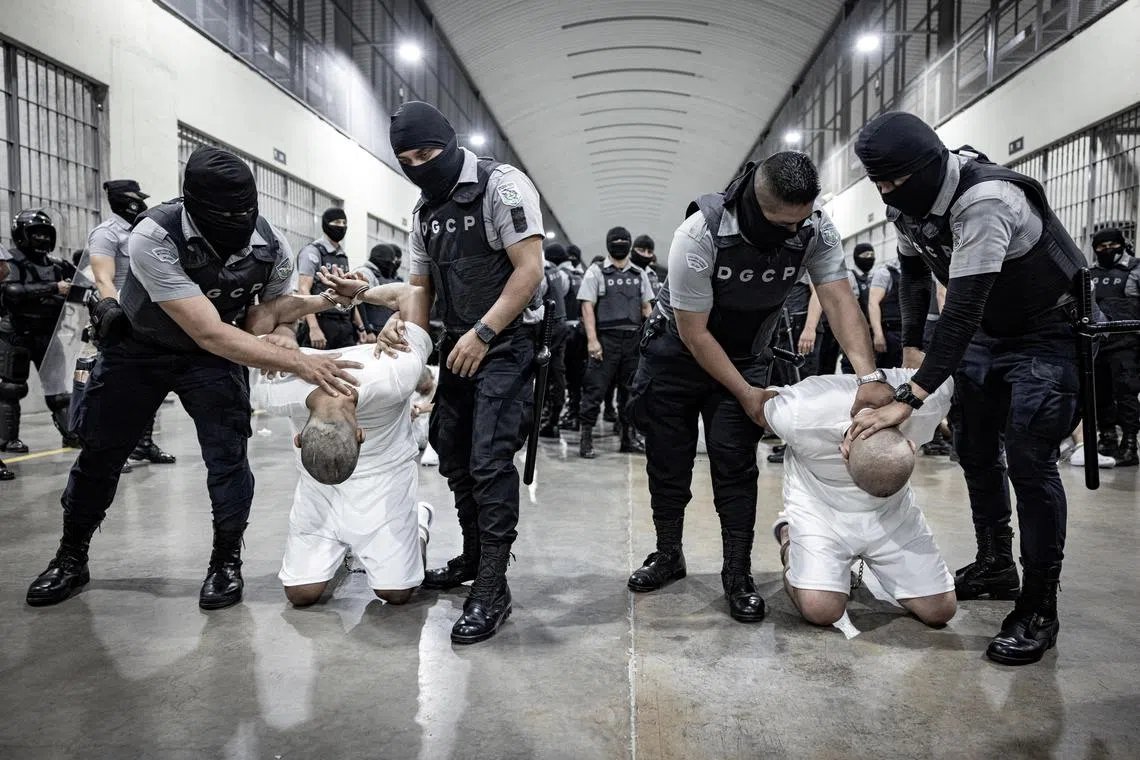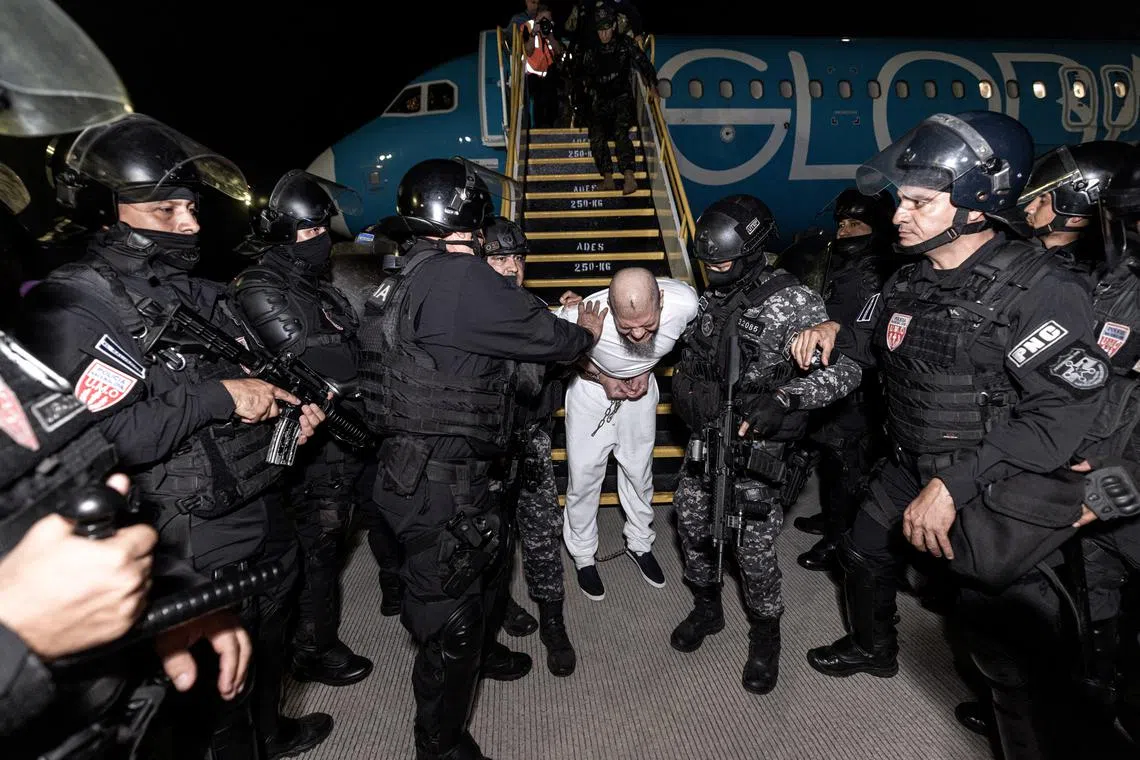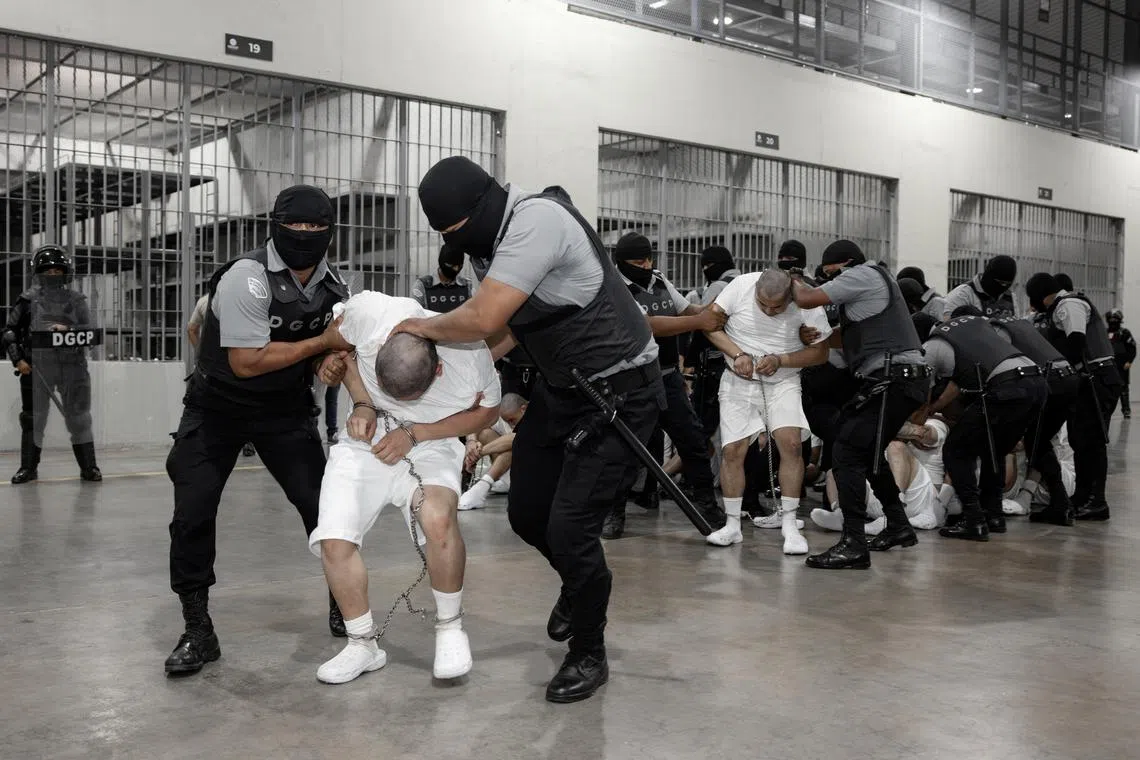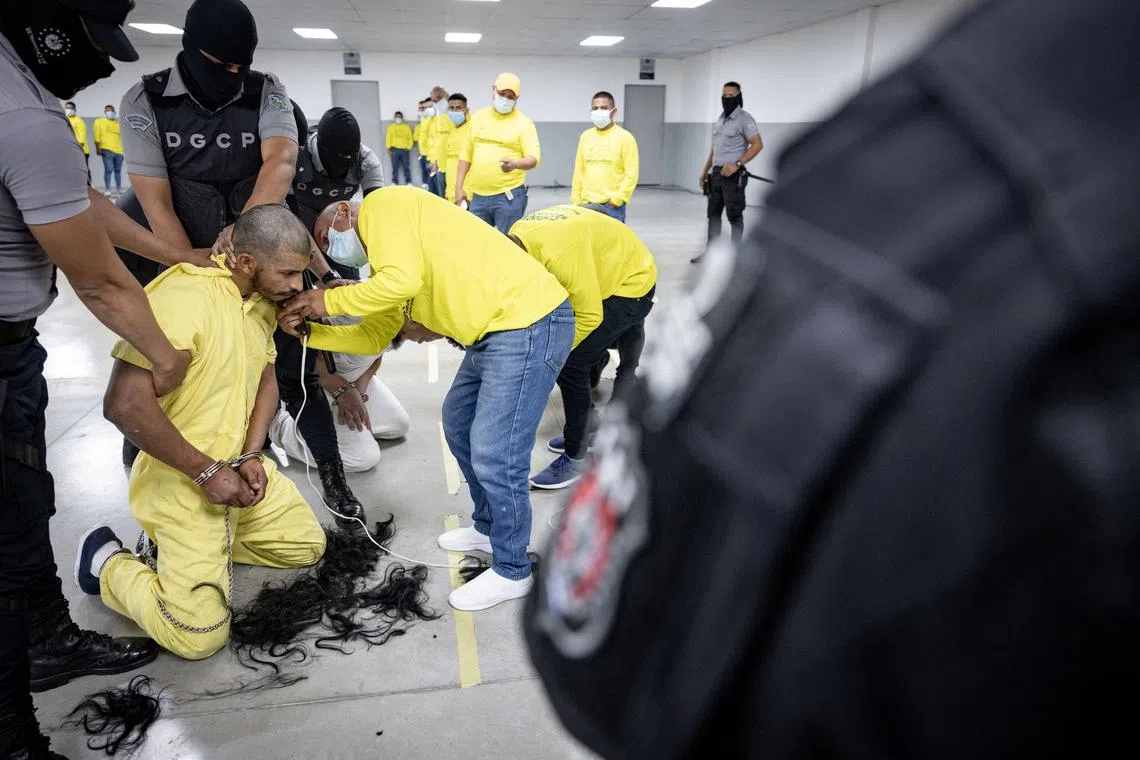Trump deported 238 Venezuelans to El Salvador, dozens with active asylum cases
Sign up now: Get ST's newsletters delivered to your inbox

Alleged Tren de Aragua gang members deported by the US government are imprisoned in El Salvador.
PHOTO: REUTERS
Follow topic:
WASHINGTON – On a Thursday morning in March, immigration agents knocked on the door of Leonel Echavez’s Dallas home looking for someone else. Despite an upcoming immigration hearing, the 19-year-old Venezuelan was taken into custody for questioning about his tattoos.
Two days later, he was on a plane heading to El Salvador’s most notorious prison.
The Trump administration deported Echavez and 237 countrymen labelled as Venezuelan gang members – with no chance to contest the allegations in court.
The US government has provided scant information about the deportees, beyond alleging that they are members of Tren de Aragua, a transnational criminal group from Venezuela that the Trump administration has designated a foreign terrorist organisation.
Through interviews with family members of 50 of the deportees – found via advocates and family members in the US and Venezuela, and checked against a leaked list of deportees published by CBS News – Reuters has captured the most comprehensive picture to date of how the men on those flights became caught up in a rapid-fire deportation process.
Twenty-seven of the Venezuelans whose cases Reuters reviewed were never ordered to be deported. They have upcoming immigration court hearings to make their asylum and other claims to stay in the US, according to immigration court records, even though they are now in El Salvador.
Judges in several cases appeared shocked to find migrants who failed to attend scheduled immigration court dates because they had been deported, according to immigration lawyers who attended the hearings.
The operation, carried out after President Donald Trump invoked the Alien Enemies Act of 1798
A US appeals court last week upheld a decision to block Mr Trump’s use of the law, leading the administration to appeal to the Supreme Court.
In a court filing late on the night of March 28, the American Civil Liberties Union (ACLU) presented what it said was a government checklist to determine Tren de Aragua members.
The undated “Alien Enemy Validation Guide” employs a points system to determine gang membership. The guide takes into account criminal convictions and court records as well as tattoos, hand gestures and clothing – criteria that experts cited by the ACLU said risk making a false identification.
When asked for comment, a Trump administration official said the administration had confidence in the process of identifying gang members.
“Intelligence assessments go well beyond a single tattoo,” the person said on condition of anonymity.

Salvadoran police officers escorting an alleged member of the Venezuelan Tren de Aragua gang, deported to El Salvador for imprisonment by the US government.
PHOTO: REUTERS
Barbers, tattoo artists
Mr Trump won back the White House pledging mass deportations and said in his inaugural address that he could invoke the Alien Enemies Act to target foreign gangs. The Trump administration has argued the law gives it vast authority to deport alleged members of Tren de Aragua.
Of the 50 deportees whose family members were interviewed, at least two dozen entered the US using a smartphone app known as CBP One, according to the family members. The app was introduced during then President Joe Biden’s administration to allow migrants to schedule an appointment to request entry at a legal border crossing. Mr Trump ended the programme as one of his first moves in office.
Eight of those deported to El Salvador by Mr Trump had been detained at the border under Mr Biden, and remained detained until their removal.
Ten of the 50 were arrested when they appeared for routine immigration check-ins.
Others were detained while going about their daily lives – filling up their cars’ petrol tanks, leaving for work, or listening to music with friends, according to interviews with family members.
They were barbers, tattoo artists, construction workers, delivery drivers and factory workers.
Family members of more than two dozen of the deportees provided Venezuelan government documents attesting to clean criminal records there, and all 50 families said their loved ones were not gang members. Reuters could not independently verify the authenticity of the documents.

Barbers, tattoo artists, construction workers, delivery drivers and factory workers are said to be among those deported to El Salvador by the US government.
PHOTO: REUTERS
Reuters found criminal charges in the US for names matching six of the men in the group, including for domestic violence and shoplifting, as well as a conviction for lewd and threatening language.
The Trump administration has acknowledged in court that many of the men sent to El Salvador do not have US criminal records.
“The lack of specific information about each individual actually highlights the risk they pose,” US Immigration and Customs Enforcement (ICE) official Robert Cerna said in a court filing on March 17.
“(It) demonstrates that they are terrorists with regard to whom we lack a complete profile.”
Echavez, the 19-year-old Venezuelan, had come to the US to claim asylum in 2023, his mother Maria Luisa Paz said, among hundreds of thousands of Venezuelans fleeing economic hardship and authoritarian government at home.
Immigrants who are considered not to pose a safety or flight risk are often allowed to pursue their asylum cases while living freely in the US, as long as they check in regularly with ICE.
Echavez, who had a work permit, worked in an aluminium plant and lived with his cousin Daniel Paz and a friend. On March 13, immigration agents were looking for Paz, who had a deportation order, according to Paz’s sister Greilys Herrera.
Echavez and his friend were caught up in the operation but told they would be released after some questions about their tattoos, she said.
Echavez has tattoos of a rose with branches, an arrow and of his sister’s name. He has an upcoming immigration court hearing scheduled for July 2026 in Dallas.

The Trump administration has acknowledged in court that many of the men sent to El Salvador do not have US criminal records.
PHOTO: REUTERS
Tattoos honouring family
Three-quarters of the 50 men had tattoos.
Immigration lawyers, family members and advocates said the authorities are rounding up young Venezuelan men with tattoos that honour family members, their professions and even soccer teams rather than signify membership in the Tren de Aragua gang.
The Trump administration insists it deported dangerous gang members even as it has declined to provide evidence.
A briefing document by ICE’s investigative arm said Tren de Aragua members have been observed with tattoos, including those of crowns, trains and clocks.
It noted other identifiers, including “sports attire from US professional sports teams with Venezuelan nationals on them” and apparel associated with former Chicago Bulls basketball star Michael Jordan.
A separate intelligence document by US Border Patrol’s El Paso Sector dated October 2023 offered conflicting guidance, saying Chicago Bulls’ attire, clocks and rose tattoos “are not a definite indicator” of gang membership.
Both documents were entered as evidence by the ACLU in its lawsuit.

Salvadoran police officers cutting the hair of an alleged member of Venezuelan gang Tren de Aragua who was recently deported by the US government to be imprisoned in El Salvador.
PHOTO: REUTERS
Known primarily for human trafficking and extortion in Latin America, Tren de Aragua does not have a significant presence in the US, according to Assistant Professor Rebecca Hanson, an expert on Venezuelan gangs at the University of Florida.
Prof Hanson in a court declaration for the ACLU said it was “absolutely implausible” that Venezuelan President Nicolas Maduro’s regime was intertwined with Tren de Aragua, a key legal point in Mr Trump’s argument for the use of the Alien Enemies Act out of a wartime context.
Members cannot be identified by tattoos or hand gestures, Prof Hanson said.
When Frengel Reyes, a 24-year-old house painter living in Tampa, Florida, with his wife and their nine-year-old son, appeared for his check-in on Feb 4, he was detained, his lawyer Mark Prada said.
In his immigration paperwork, ICE said Reyes may be an “affiliate” of Tren de Aragua. The records, reviewed by Reuters, included someone else’s alien registration number and another person’s name, and wrongly identified him as a woman. They included no evidence of gang affiliation.
According to Mr Prada, the ICE attorney told the immigration court judge that the government did not have to provide proof its records were correct as it was not an “evidentiary hearing”.
“The government has provided no evidence in its claim that he may be a gang member, and then disappeared him,” Mr Prada said in an interview. “This is complete lawlessness.”
In the asylum case of Andry Hernandez, a gay make-up artist who was detained at the border when he requested entry under the CBP One app during the Biden administration, ICE alleged gang membership based on his tattoos.
“Crown has been found to be an identifier for a Tred de Aragua gang member,” an officer wrote in a September 2024 screening summary. The officer gave that five points. No other categories were marked.
The tattoos in question? Crowns on his wrists, one saying “mom” and the other “dad”. REUTERS

